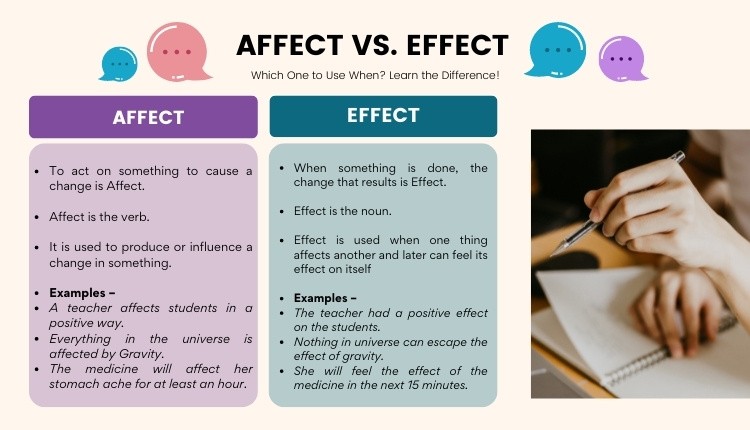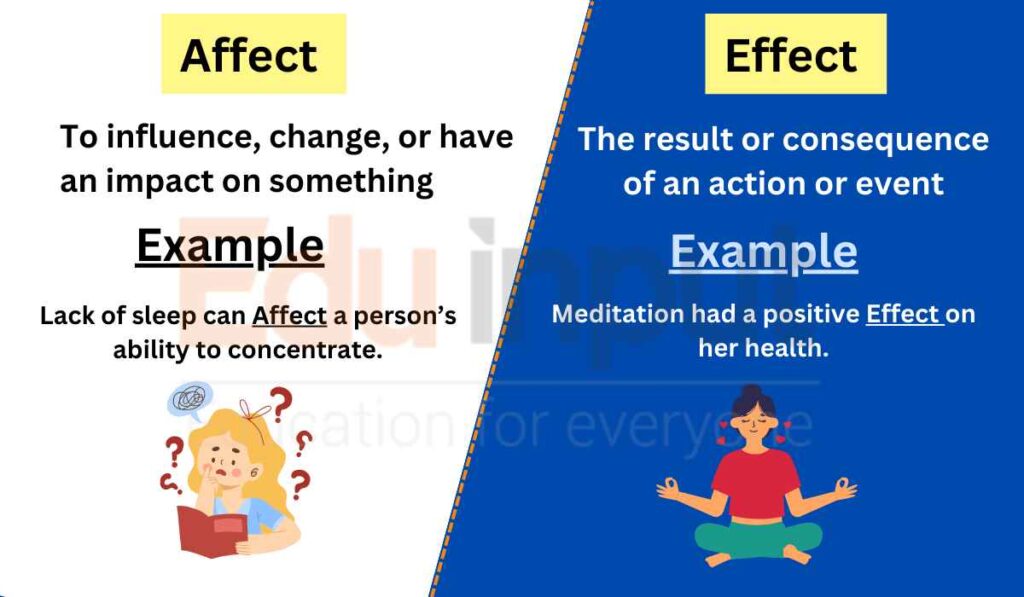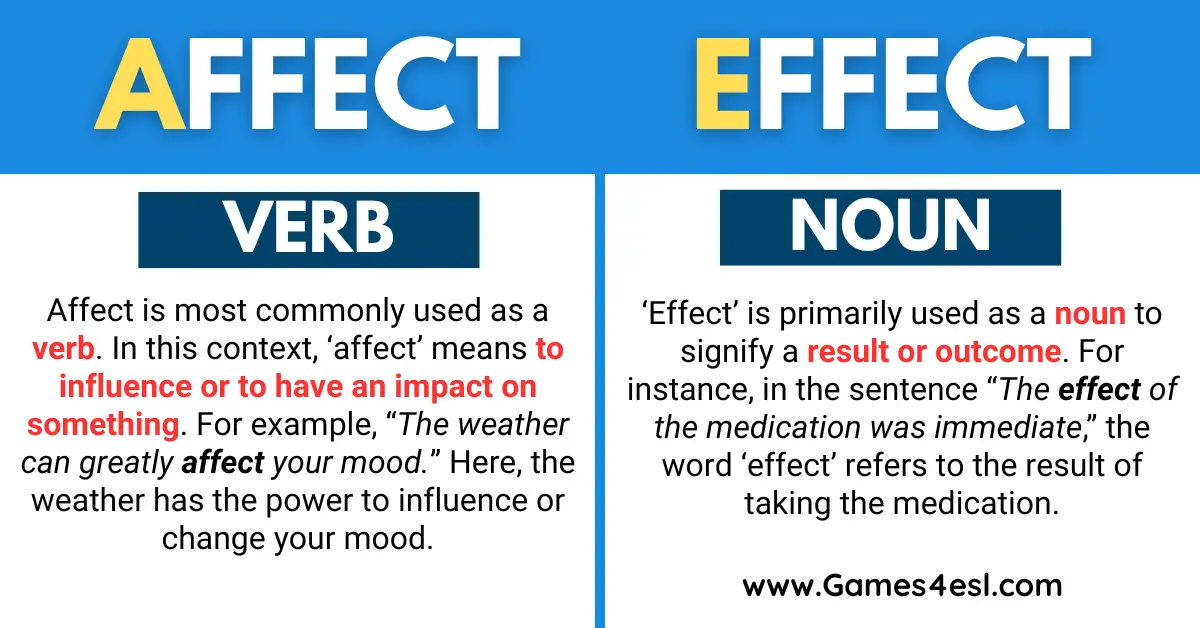Mastering Effect Vs Affect: Your Friendly Guide To Grammar Clarity Today
It's almost like a secret handshake among English speakers, isn't it? The words "affect" and "effect" cause a bit of a stir, even for folks who have spoken English their whole lives. You might feel a little lost sometimes when trying to pick the right one. That's perfectly normal, you know.
Right now, so many people find themselves pausing, wondering if they should use "affect" or "effect" in their sentences. It's a common puzzle, and honestly, our own language can be a bit tricky with these two words. Many native speakers, especially in places like the USA, often just use the word "impact" for everything because it can be both a verb and a noun, which is rather convenient.
But don't you worry, because by the end of this chat, you'll have a much clearer picture of how these words work. We're going to clear up the confusion and give you some simple ways to remember which one to choose, making your writing and speaking a lot more precise, which is good.
- Who Are Pharrell Williams Parents Meet Pharoah
- Vick Hope Bio Age Wiki Facts And
- Who Is Rogel Lazaro Aguilera Mederos Wife
- Connor Payton Is Sean Payton S Son
- Jon Batiste Bio Age Parents Wife Children
Table of Contents
- Understanding the Basics: Affect vs Affect
- Affect: The Verb, Mostly
- Effect: The Noun, Usually
- The Rare Exceptions You Might Hear
- Why the Confusion Happens
- Simple Tricks to Remember
- Practice Makes It Stick
- Frequently Asked Questions
Understanding the Basics: Affect vs Affect
So, the big question is, what's the actual difference between "affect" and "effect"? It's a question many people ask, and honestly, it's quite simple when you break it down. Think of it this way: one is usually an action, and the other is usually a result. That's the main idea, really.
Our language has these little quirks, and "affect" and "effect" are a prime example. You will notice that this is a topic that thoroughly confuses native speakers, so most, at least in the USA, just use the word "impact" for everything. Because "impact" can be both a verb and a noun, it seems easier for many. But we can do better, you know.
We're going to look at each word on its own, giving you clear meanings and lots of examples. This way, you can start to feel much more comfortable using them correctly in your everyday chats and your important papers. It's all about building that confidence, after all.
- Utah Ivana Meandzija Missing Or Found Case
- Who Is Christopher Bell Wife Morgan Kemenah
- Ify Nwadiwe And Wife Aurora Has A
- Where To Find All The Princess Quest
- Kenny Babyface Edmonds Finalizes Divorce With Nicole
Affect: The Verb, Mostly
Typically, "affect" shows up as a verb. This means it's an action word. When you use "affect," you are talking about something that causes a change. It's about influencing something or someone. This is its most common job in a sentence, which is pretty straightforward.
How Affect Shows Change
To "affect" something means to change how someone or something develops. It's about having an influence on a situation or a person. Think of it as the act of making a difference, even a small one. It's the doing part of the equation, you could say.
For example, if the weather changes, it might "affect" your plans. The weather is doing something to your plans. It's acting upon them. This shows a direct action, which is what verbs do, naturally.
Another way to think about it is that "affect" is to cause something to change. It's the process of making that alteration happen. So, if you're ever unsure, ask yourself if the word you need describes an action of changing something. If it does, "affect" is probably your pick, usually.
Affect in Action: Examples
The new rules will greatly affect how we do business. (The rules are changing the business process.)
Did the cold weather affect your garden? (The cold weather caused a change in the garden.)
Her kind words affected him deeply. (Her words influenced his feelings.)
Lack of sleep can affect your ability to focus. (Not enough sleep can change your focus.)
The artist's style was affected by his travels. (His travels influenced his artistic style.)
How will this decision affect the team's morale? (The decision will cause a change in morale.)
Smoking can seriously affect your health over time. (Smoking causes negative changes to health.)
The speaker's passionate plea affected the audience. (The plea moved or influenced the audience.)
Will the new policy affect student enrollment? (The policy will cause a change in enrollment numbers.)
Noise pollution can affect the local wildlife. (Noise pollution causes changes for the animals.)
Effect: The Noun, Usually
Now, let's talk about "effect." This word is almost always a noun. A noun names a person, place, thing, or idea. So, when you use "effect," you are talking about the result of an action, the outcome, or the consequence. It's what happens after something has been affected, if that makes sense.
What Effect Means as a Noun
"Effect" is the change itself. It's a powerful result that something, especially something new, has on a situation or person. If "affect" is the cause, then "effect" is what you get. It's the impact, the consequence, the end product of an action. That's really the key.
For instance, the "effect" of the cold weather was frost on the plants. The frost is the result. It's the thing that happened. So, if you're looking for the word that describes the actual change or outcome, "effect" is usually what you need. It's the tangible or observable result, you know.
Effect in Action: Examples
The new rules had a positive effect on our sales. (The positive result on sales.)
What was the effect of the cold weather on your garden? (The outcome for the garden.)
His kind words had a calming effect on her. (The calming result of his words.)
The medicine had an immediate effect. (The immediate result of the medicine.)
The special effects in the movie were amazing. (The visual results created for the film.)
We are still waiting to see the full effect of the changes. (The complete outcome of the changes.)
The ripple effect of their actions was felt across the community. (The spreading consequence of their actions.)
The loud noise had a jarring effect on everyone. (The jarring result of the noise.)
The long-term effects of pollution are concerning. (The long-term results of pollution.)
The new policy will take effect next month. (The policy will begin its operation next month.)
The Rare Exceptions You Might Hear
Now, as with many things in English, there are a few rare times when these words swap roles. But honestly, for most everyday talking and writing, you don't really need to worry about them. My text even says, "Affect is a verb, effect is a noun (except in rare situations that need not worry about)." So, let's just touch on them briefly, just so you know, but don't get too caught up in them.
Affect as a Special Noun
In very specific fields, especially in psychology, "affect" can be a noun. This is a term only used in psychology, to refer to the way people experience and express emotion. For instance, you might hear a psychologist talk about a patient having "flat affect," which means they show little to no emotion. But this is a technical term and not something the average layperson will encounter, so it's really not for general use, you know.
So, unless you're studying or working in psychology, you can pretty much stick to "affect" as a verb. It's a very specialized meaning, and using it as a noun outside of that context would sound a bit odd, honestly.
Effect as a Less Common Verb
And then there's "effect" as a verb. This is much less common, but it does exist. When "effect" is used as a verb, it means "to bring about" or "to accomplish." It's about making something happen, rather than simply influencing it. It's a bit more formal, and you'll often see it in phrases like "to effect change" or "to effect a rescue."
For example, "The new mayor hopes to effect positive change in the city." Here, "effect" means to bring about or make that change happen. But again, this use is pretty rare compared to "effect" as a noun, so you probably won't run into it every day, you know.
Why the Confusion Happens
It's fair to ask why these two words are so easy to mix up. Part of the reason is that they sound so similar. They both start with 'a' and 'e' sounds, and they have almost the same pronunciation. This similarity can trick our brains into thinking they're interchangeable, when they're really not, you know.
Another reason is that the concepts they represent, cause and result, are very closely linked. One cannot exist without the other, so it's natural for people to get them tangled. Plus, as our text mentions, even native speakers struggle with these, so it's a widespread challenge. That's just how language can be sometimes, isn't it?
And then there's the word "impact." Because "impact" can be both a noun and a verb, it often gets used as a stand-in for both "affect" and "effect." While "impact" is a useful word, relying on it too much can prevent us from truly understanding the specific roles of "affect" and "effect." It's a bit of a shortcut, you know.
Simple Tricks to Remember
Don't you worry, there are some easy ways to keep "affect" and "effect" straight. One very popular tip is to remember the word "RAVEN." It helps a lot, actually.
Remember
Affect is a
Verb
Effect is a
Noun
This little memory aid works for most situations and is pretty effective, you know. If you can just recall "RAVEN," you're usually on the right track.
Another trick is to think about the letter 'A' in "affect" standing for "action." So, "affect" is the action of changing something. And the letter 'E' in "effect" can stand for "end result." So, "effect" is what happens at the end. It's a simple way to visualize it, really.
You can also try substituting other words. If you can replace the word with "influence" (as a verb), then "affect" is probably correct. If you can replace it with "result" or "consequence" (as a noun), then "effect" is likely what you need. This little test can be quite helpful, you know.
Think about it like this: "The cause *affected* the outcome." And "The cause had an *effect*." See how the words fit into those patterns? One is the action, the other is the thing that results from the action. It's a pretty clear distinction, you know.
Practice Makes It Stick
The best way to get good at using "affect" and "effect" is to practice. The more you use them correctly, the more natural it will feel. Try writing a few sentences every day using both words, making sure you're picking the right one based on whether you need a verb or a noun. It really does help, you know.
You could also try reading more, paying close attention to how authors use "affect" and "effect" in their writing. This kind of active reading can strengthen your own understanding and usage. It's a good way to learn, actually.
Don't be afraid to make mistakes along the way. Everyone does, even experienced writers. The important thing is to keep trying and keep learning. That's how we all get better at anything, isn't it?
If you're ever truly stuck, you can always consult a good dictionary. They will explain further, as my text suggests. A reliable source like a well-known online dictionary can offer more details and examples. It's a handy tool to have, truly.
Remember, mastering these words is a step toward clearer communication. Learn more about grammar rules on our site, and perhaps link to this page other common English confusions for more helpful tips. It's all about making your message shine, you know.
Frequently Asked Questions
What is the main difference between "affect" and "effect"?
Basically, "affect" is nearly always a verb, meaning to cause a change or to influence something. "Effect" is almost always a noun, meaning the result or consequence of a change. So, one is the action, and the other is the outcome, you know.
Can "effect" ever be a verb?
Yes, but it's pretty rare in everyday talk. When "effect" is used as a verb, it means "to bring about" or "to accomplish," like "to effect change." It's a bit more formal, and you won't typically see it as often as "effect" as a noun, you know.
Why do so many people get "affect" and "effect" mixed up?
Well, they sound quite similar, and the concepts they represent (cause and result) are closely linked. Even native speakers struggle with these words, often using "impact" as a substitute because it can be both a verb and a noun. It's a common point of confusion in our language, you know.
- Does Phaedra Parks Own A Funeral Home
- Who Is Christopher Bell Wife Morgan Kemenah
- Paula Harwood Bio Net Worth Height Career
- Who Is Evelyn Lozada Dating Queens Court
- Executive V C Of Dallas Cowboys Charlotte

6 Tricks to identify Affect vs. Effect with Examples

Affect vs. Effect-Difference Between With Examples

Affect Vs Effect: Key Differences, Example Sentences, And Tips To